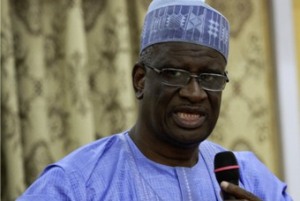Blog Archives
PROFILE: DR BELLO HALIRU MOHAMMED, MINISTER OF DEFENCE
Dr. Bello Haliru Mohammed was born in Birnin Kebbi, capital of Kebbi State on 9 October 1945.
He started his primary education in Birnin Kebbi. For his secondary school, he attended the famous Government College (now Barewa College), Zaria. In 1966, he proceeded to Ahmadu Bello University (ABU), also in Zaria, where he studied veterinary medicine. He is a Fellow of the College of Veterinary Surgeons of Nigeria (FCVSN).
Mohammed started work as a lecturer at Ahmadu Bello University, Zaria, but he was soon summoned to responsibilities beyond the ivory tower. In 1977, he was appointed Commissioner for Agriculture under the military government in the then Sokoto State (the state was later split into Sokoto and Kebbi States in 1995). He was subsequently redeployed as Commissioner for Education under the same government.
In 1979, when the military was first stepping back to barracks, Mohammed joined the Great Nigeria Peoples Party (GNPP), contested Deputy Governor of the old Sokoto State, but his party lost to the National Party of Nigeria (NPN). Thereafter, he remained the GNPP’s Secretary for Sokoto State until 1983 when the army again ousted the civilian government.
As the military government had also banned party politics, Mohammed turned to the private sector, becoming the Managing Director of Alpha & Beta Merchants Ltd, a general merchandise company. From there, he moved on to the post of Assistant General Manager, and later General Manager, of the Rima River Basin and Rural Development Authority, an agency of the Federal Ministry of Water Resources.
In 1988, he was appointed, by the then military President, Gen Ibrahim Babangida, to head the Nigerian Customs Service (NCS) as its Comptroller General. He held that post until 1994, when Gen Sani Abacha as head of state, appointed a Military Sole Administrator (Brig Gen S. O. Ango) to run the Customs Service.
During Gen Abacha’s ill-fated transition programme from 1995 to 1998, Mohammed was a founding member of the Democratic Party of Nigeria (DPN). After Abacha’s death and the disolution of the DPN and other parties, he then became a founding member of the People’s Democratic Party (PDP), having participated in the landmark meeting at which it was decided that the political association then known as G-38, should transform into a broad-based political party. He was in fact one of the four ‘conveners’ selected to form the PDP in Kebbi State in 1998.
After the PDP’S victory in the 1999 elections, President Olusegun Obasanjo in September of that year, appointed Mohammed as a Commissioner on the Revenue Mobilization Allocation and Fiscal Commission (RMAFC), an agency which monitors accruals into, and disbursements of revenues from, the Federation Account, and also reviews the country’s revenue allocation formula periodically, in order to ensure conformity with changing realities. He was one of 37 commissioners representing each state of the federation and the Federal Capital Territory on the Commission. Less than two years later, in June 2001, Obasanjo appointed him as Minister of Communications, a post he held till May 2003.
Soon after he left the cabinet, Mohammed again returned to the party bureaucracy. In June 2004, he was elected National Vice Chairman of the PDP for the North West Zone comprising the seven states of Kaduna, Katsina, Kano, Kebbi, Sokoto, Jigawa and Zamfara.
In March 2008, he was elevated to the office of Deputy National Chairman of the party. In January 2011, he emerged as the PDP’s seventh National Chairman. Meanwhile, he was also the chairman of the Board of the Nigerian Railway Corporation (NRC), a 20-member body which oversees and supervises the activities of the Corporation and also approves the award of contracts up to certain limits.
Dr Mohammed is married and has six children.
